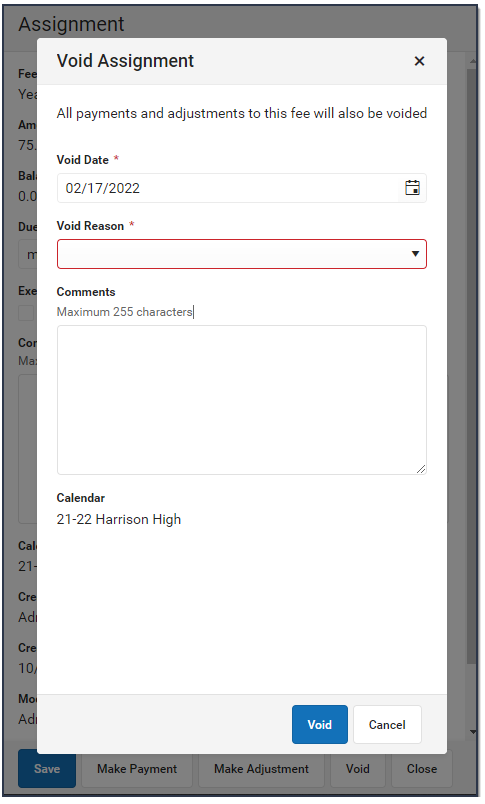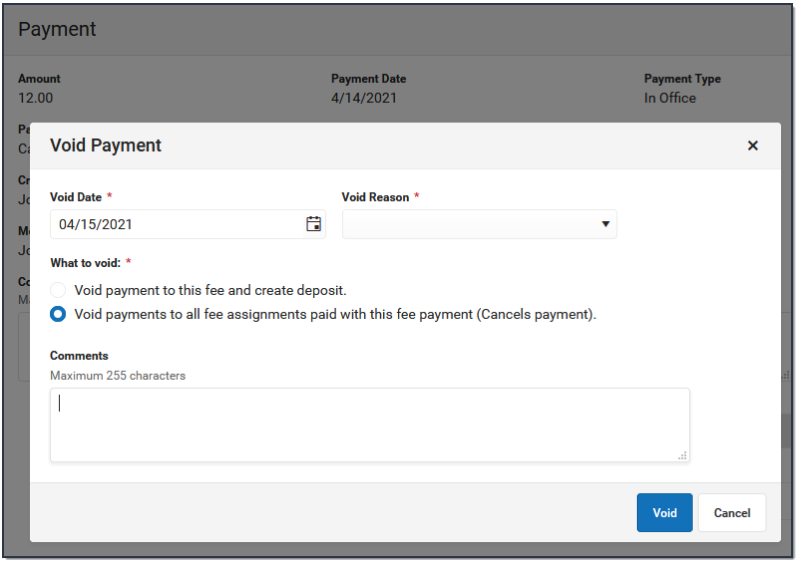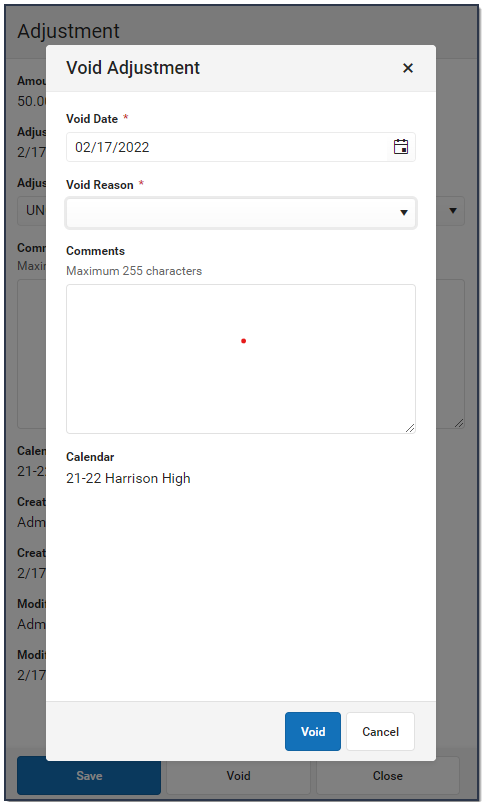Tool Search: Fees
The Fees tool lists all fees that have been assigned to a person, including all payments and adjustments and a total of how much is still owed or if a surplus exists. If the person has reached the maximum fee amount established by the school and/or district, that will be noted in the Fees Editor.
If a fee was paid using an online payment, the fee Assignment, Payment or Adjustment CAN be voided or exempted.
The other option is to use the Payments Reporter to refund the payment.
| What can I do? |
|---|
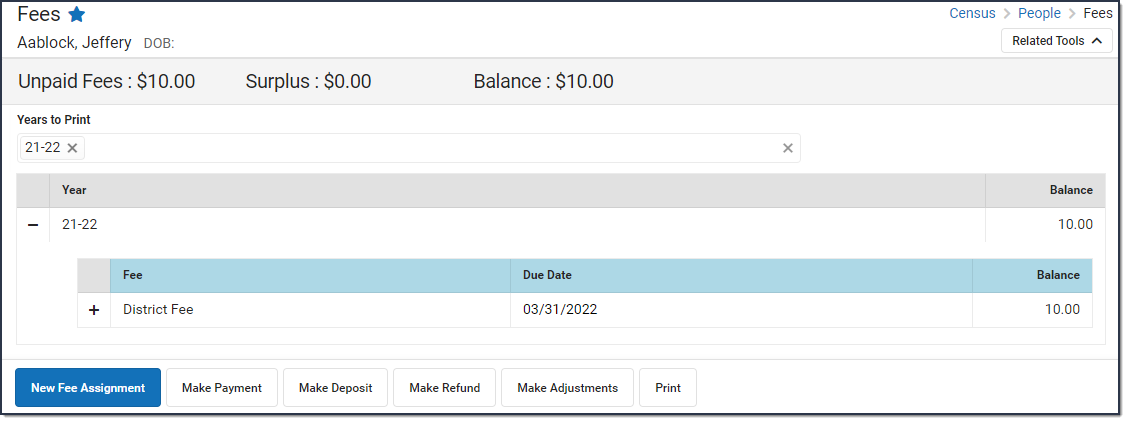
Assign and Edit Fees
For a fee to appear in the Fees Editor, it must first be assigned to the person, either individually or en masse using the Fee Wizard in the Fees section. Fees available for assignment depend on the options set by the school or district and are created in the Fees tool. Only fees that are marked as active can be assigned to students.
Once a fee is assigned to a person, it cannot be deleted, only voided.
Assign a Fee
- Click the New Fee Assignment button. The New Fee Assignment panel displays.
-
Select a Fee from the dropdown list.
- If applicable, enter the Amount of the fee.
If the description of the fee ends in an asterisk (*), the fee amount can be edited.
- Enter a Due Date for the fee in mmddyyyy format. Clicking the date field opens a calendar of the current month which defaults to the current date.
- If the person is exempt from paying this fee, mark the Exempt checkbox.
- Select the Calendar to which the fee should be assigned.
The enrollment record from the school/calendar selected in the toolbar is selected by default. - Enter any comments related to the fee assignment in the Comments field.
- Click the Save button. The new fee displays in the Fee Editor with the Unpaid Fees total adjusted appropriately.
Edit a Fee Assignment
Once a fee is assigned, click the Assignment line to display the Assignment panel. The Assignment panel displays the Fee, the Amount and the Due Date, the Exempt checkbox, any Comments attached to the fee, the calendar in which the fee was created and the name of the user(s) who created and modified the fee. To edit a Fee Assignment,
Only the Due Date, Exempt, and Comments fields can be modified in this panel. To change the amount of a fee, make an adjustment.
Adjust Fees
Fee adjustments are used to modify the amount due for a fee. Fee adjustments may only be made for up to the amount of the fee assignment.
Make an Adjustment
- Select the Fee Assignment(s) for which the adjustment is being made. The Assignment panel displays.
- Click Make Adjustment button. The Adjustments panel displays.
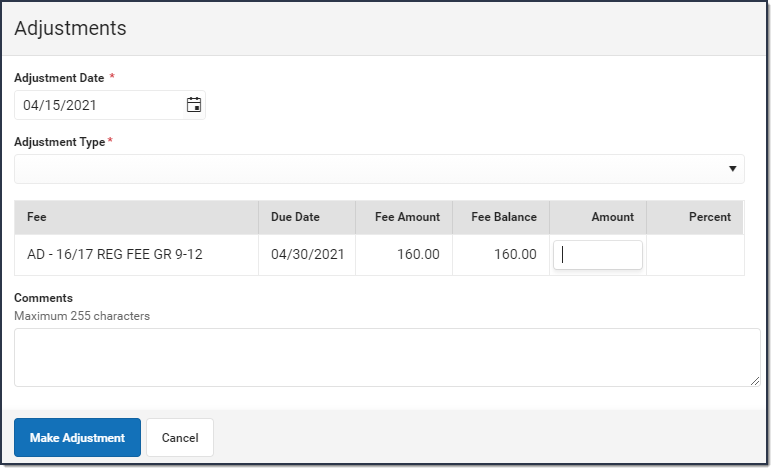
-
Enter an Adjustment Date in mmddyyyy format.
Click the date field to open a calendar of the current month which defaults to the current date.
- If applicable, select the Adjustment Type such as Activity Cancelled, Cost Adjustment or Uncollectible.
-
Enter the amount to be removed from the fee(s) in the Adjustment Amount or % field.
The subtracted amount cannot exceed the amount of the fee assignment - Enter any Comments associated with the adjustment.
- Click Save when finished. Upon saving, the entered adjustment displays below the fee to which it was applied with the date of the adjustment, the amount deducted in the Credit column.
Edit an Adjustment
Once an adjustment is made, clicking on the adjustment displays the Adjustment panel which includes the adjusted Fee, the Adjustment Date, the Adjustment Type, any Comments attached to the adjustment, the calendar in which the adjustment was made and the name of the user(s) who created and modified the adjustment.
Only the adjustment Type and Comments can be added or modified in this panel. Click Save when finished.
Making Adjustments After an Online Payment is Made
Users have the option to void a payment made online using the Fees tool, or refund the payment amount using the Payments Reporter tool.
These options are also available when adjustments are made after a fee assignment was paid online. Below is an example.
- A parent paid for a fee online for $100.
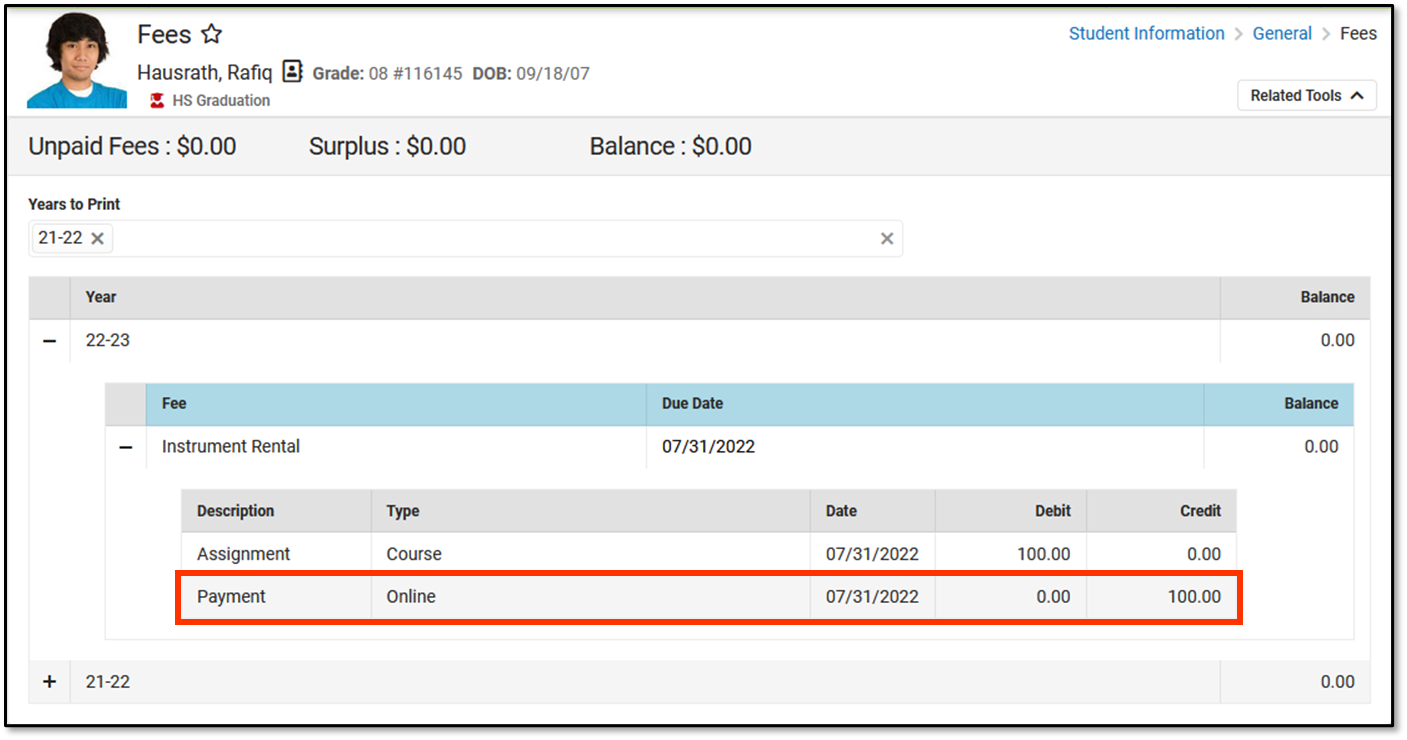
- An adjustment for $30 was made after the payment was made.
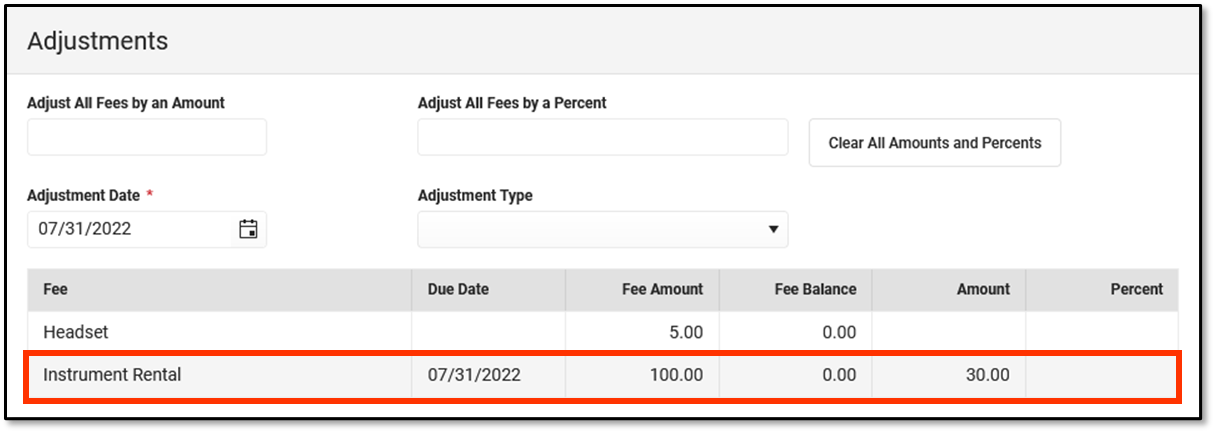
- This message appears when the amount of the adjustment is refunded to the parent.
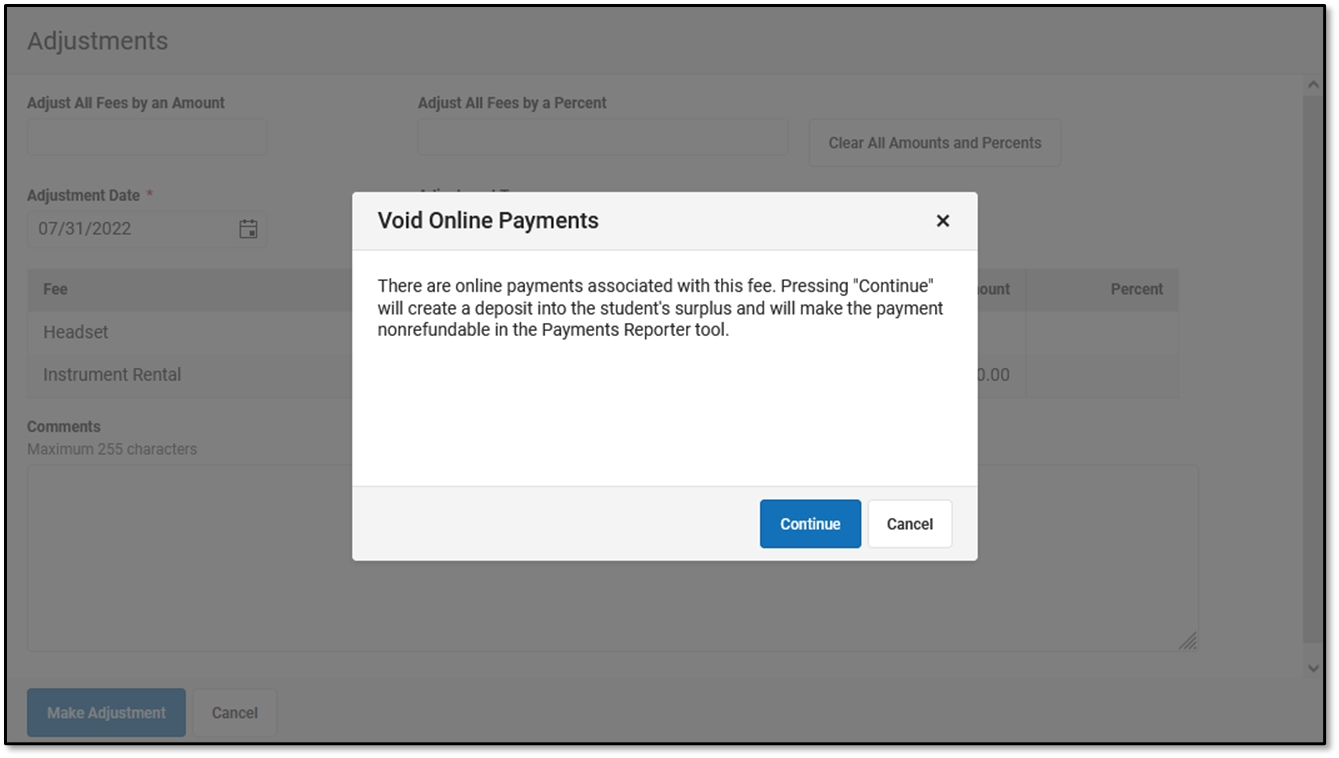
- Clicking Continue does the following:
- The payment amount of $100 is voided and a deposit is made into the surplus.
- A withdrawal of $70 is made to pay for the new fee amount.
- A surplus of $30 remains. The online payment can NOT be refunded in the Payments Reporter tool.
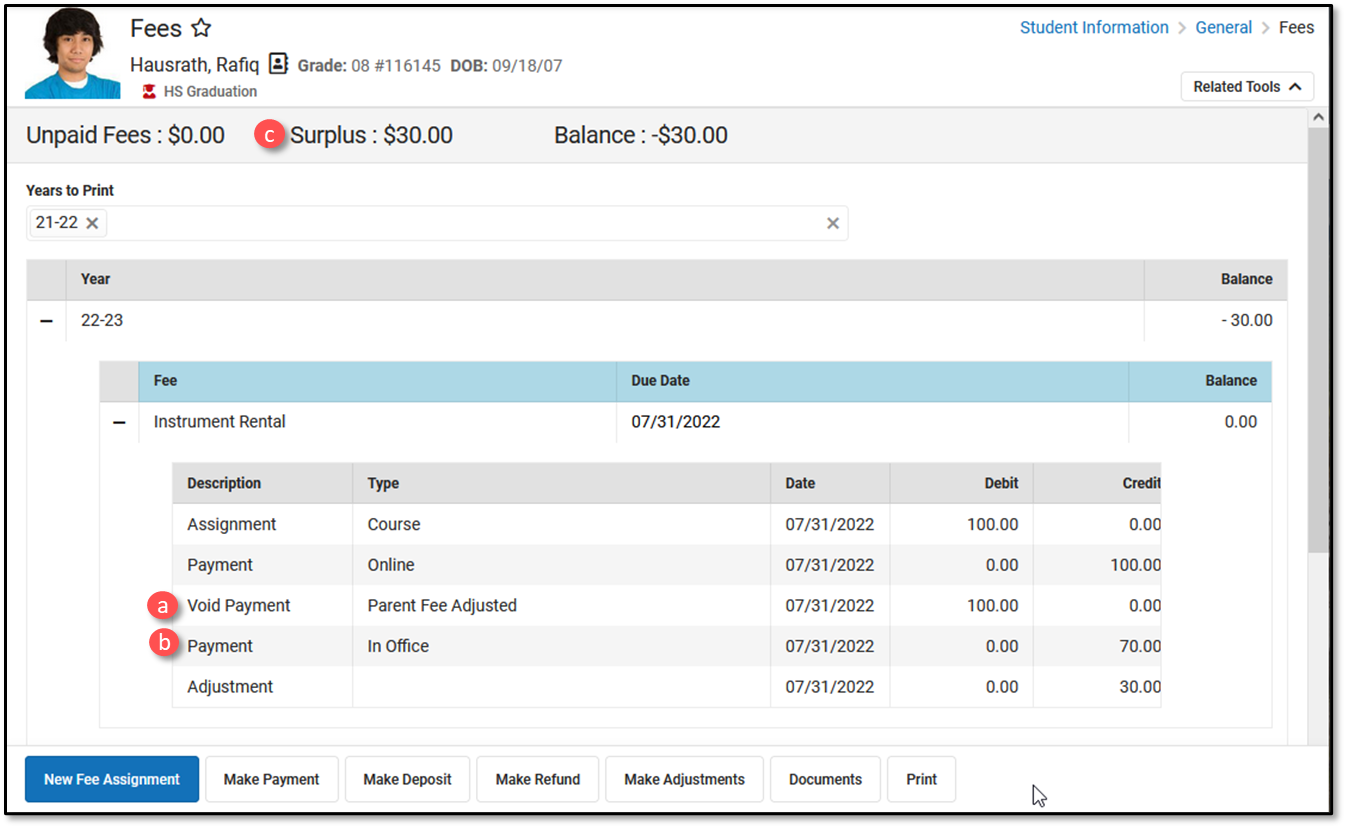
- Clicking Cancel does not make the adjustment. The adjustment has to be made as a partial-return in Payments Reporter.
Pay Fees
Fees can be paid one at a time or you can pay multiple fees with a single payment.
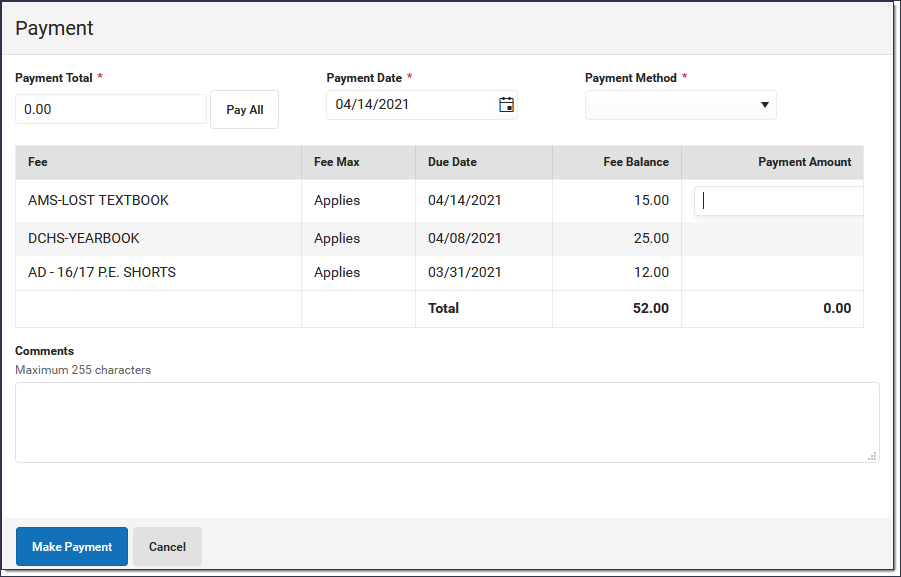 Example of Paying Multiple Fees with One Payment
Example of Paying Multiple Fees with One Payment
Make a Payment
- Click the Make Payment button at the bottom of the screen. The Payment panel displays all fees from all years for which a payment is needed.
You can also access the Payment panel by clicking an individual fee then clicking the Make Payment button on the Assignment panel.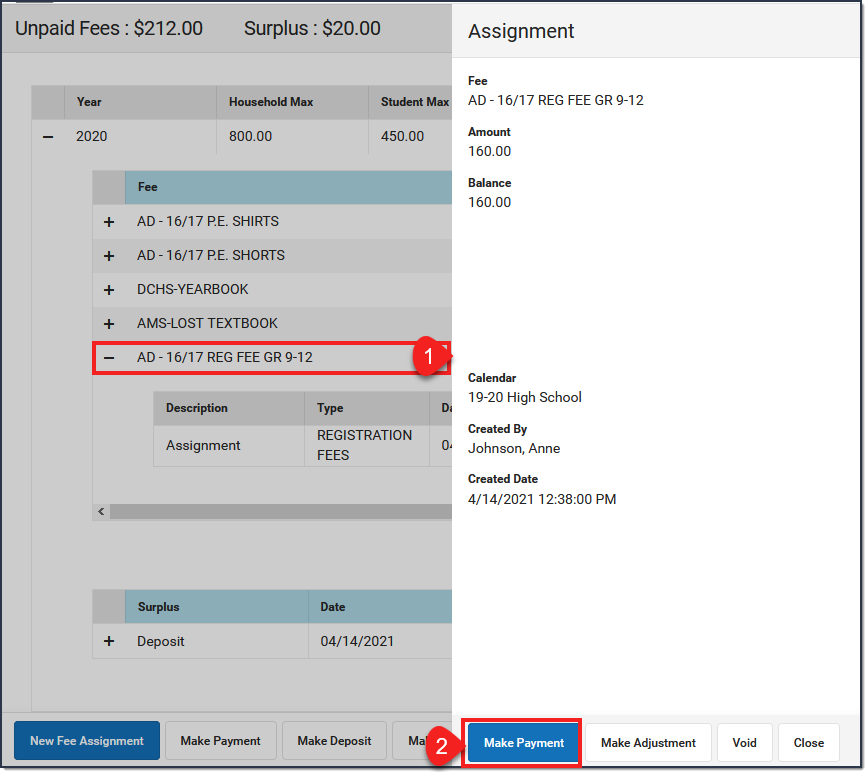
- Enter a Payment Date in mmddyyyy format.
- Enter the amount of the payment using one of the following options.
Option Description Pay All Click Pay All to populate this field with the total amount remaining to be paid. 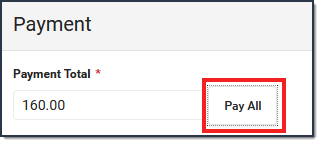
Payment Total The Payment Total field at the top of the panel allows you to enter the amount to be paid. If the total amount exceeds the Fee Assignment amount, the remaining amount is deposited as a surplus. 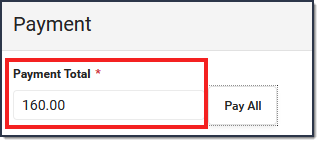
PaymentAmount The Payment Amount column allows you allows you to manually enter a unique value for each line. Campus automatically updates the Payment Total to match the values you enter. 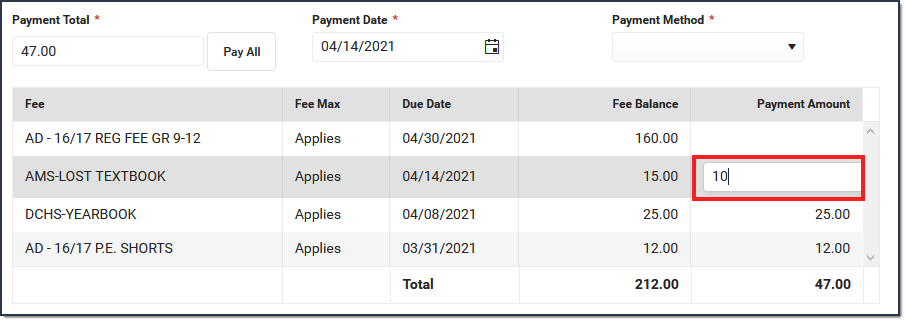
-
Enter any Comments associated with the payment.
-
Select one of the following Payment Methods and complete the payment.
Payment Method Description Cash Click the Make Payment button. If more than the amount of the fee selected is paid, the extra amount becomes a Surplus. Campus saves the surplus amount and it can be applied to other fees. Check The Check # field displays when you select this option. Enter the Check # then click the Make Payment button.
 The payment displays below the fee(s) with the type and date of the payment, the amount paid in the Credit column. If more than the amount of the fee selected is paid, the extra amount becomes a Surplus. Campus saves the surplus amount and it can be applied to other fees.
The payment displays below the fee(s) with the type and date of the payment, the amount paid in the Credit column. If more than the amount of the fee selected is paid, the extra amount becomes a Surplus. Campus saves the surplus amount and it can be applied to other fees.Surplus (Balance: $XX.XX) This option only displays if a surplus is available on the account.
Click the Make Payment button.
The Surplus Balance is reduced by the amount used to pay the fee. The payment displays below the fee(s) with the type and date of the payment, the amount paid in the Credit column.Record Credit/Debit Card If your district does NOT use Online Payments or a Card Reader, enter the Reference Number then click the Make Payment button.
The payment displays below the fee(s) with the type and date of the payment, the amount paid in the Credit column. If more than the amount of the fee selected is paid, the extra amount becomes a Surplus. Campus saves the surplus amount and it can be applied to other fees.Process Credit/Debit Card
(Mobile Payments App)Complete these steps if you are using a Card Reader.
Process Credit/Debit Card (Manual Entry) Complete these steps if you do not have a Card Reader.
Payment Panel
Only Comments can be added or modified in this panel.
After a payment is made, you can click the payment to display the Payment panel. This panel includes the Payment Date, the total Amount, the Payment Method, and any Comments attached to the payment. The calendar in which the payment was made and the name of the user(s) who created the payment also display.
Below the Comments section, the panel displays all fees paid with that payment, the due dates of each fee, and the amount paid for each fee.
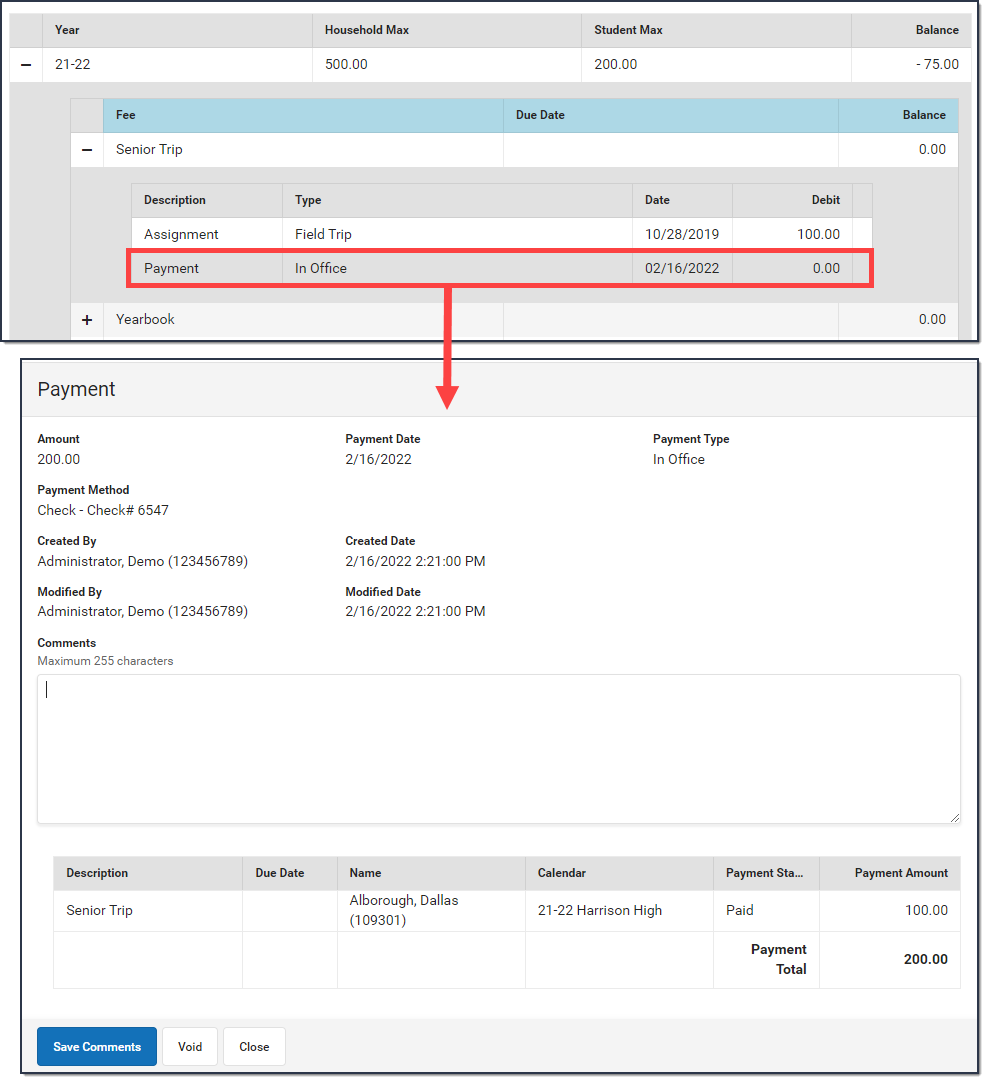
Void a Fee Assignment, Payment, or Adjustment
Transactions may NOT be deleted. Instead, they are voided which reverses the transaction. The procedures in this article describe voiding Fee Payments and Adjustments that were entered using the Fees tool in Campus.
Important Information About this Process
- Deposits cannot be voided, only refunded.
- Voiding a Fee Assignment also voids all Payments and Adjustments attached to the assignment.
- If a payment transaction originally included surplus funds which were then reallocated to another fee, the original payment cannot be voided. Later payments made with the surplus funds must first be voided before the original payment can be voided.
- When voiding a fee that was paid using an online payment, this message appears:
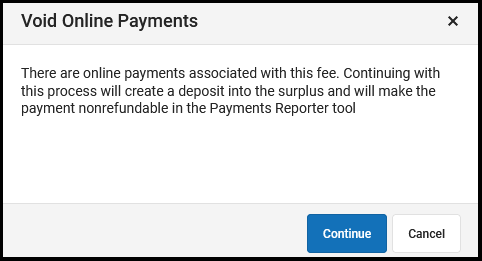 Clicking Continue voids the payment and deposits the amount of the online payment into the surplus, and the payment can NOT be refunded in the Payments Reporter tool.
Clicking Continue voids the payment and deposits the amount of the online payment into the surplus, and the payment can NOT be refunded in the Payments Reporter tool.
Clicking Cancel does NOT void the online payment through the Fees tool. Instead, you can use the Payments Reporter to refund the payment.
Void an Assignment, Payment, Or Adjustment
- Select the Assignment, Adjustment or Payment and click the Void button.
A Void Detail screen displays.
When voiding... The Void Detail Screen... an Assignment includes the Fee assigned, the Amount, the Due Date and any Fee Comments. Expand the area below to see an example of this screen.
a Payment includes the Payment Date, the Amount paid, the Payment Method and any Fee Payment Comments. A table detailing the payment transaction appears following the summary information which includes the Fee, the Due Date, the Amount owed and the Payment Amount, as well as any deposits made as a result of the payment.
When voiding a Payment, indicate the Payment Void Type.- Void payment to this fee and create deposit voids the selected payment only and creates a surplus with the amount paid.
- Void payments to all fee assignments paid with this fee payment voids the selected payment and any other payments made in the same transaction. All payments made in the transaction payment are listed in the payment transaction table.
Expand the area below to see an example of this screen.
an Adjustment includes the Void Date, Void Reason, and any Adjustment Comments. Expand the area below to see an example of this screen.
- Enter a Void Date in mmddyyyy format. Clicking the date field will open a calendar of the current month below. This field defaults to the current date.
- Select a Void Reason from the dropdown list, such as Activity Cancelled, Office Mistake or Uncollectible.
- Enter any Comments associated with the void transaction.
- Click Void when finished.
After a Payment or Adjustment is void, Campus adds a line to the editor to reverse the credit. When an Assignment is void, Campus adds a line to reverse the debit and labels the assignment as Void.

Make a Deposit (Surplus)
Deposits create a surplus that can be applied to future fee assignments.
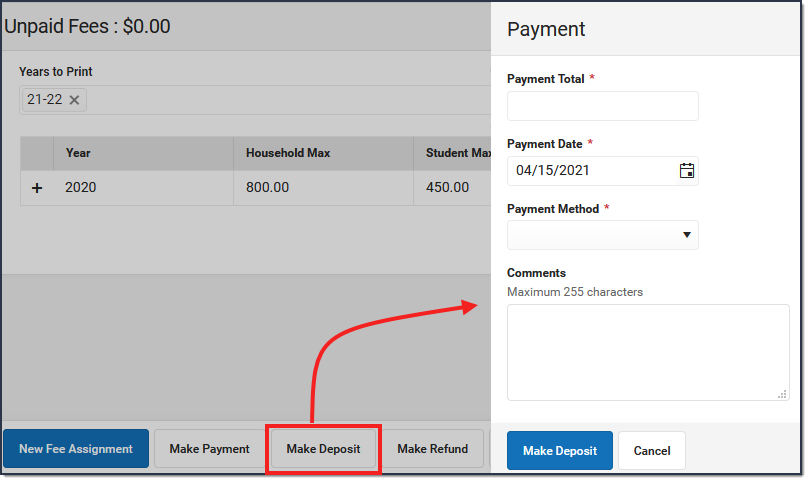
- Click the Make Deposit button. The Payment panel displays.
- Enter the amount of the deposit in the Payment Total field.
- Enter the Payment Date in mmddyyyy format.
- Select a Payment Method from the dropdown list.
- Cash
- Check - enter a Check #
- Record Credit/Debit Card - enter a Reference #
- Enter any Comments associated with the deposit.
- Click Make Deposit.
The Surplus amount is updated and can be applied to an unpaid fee at any time.
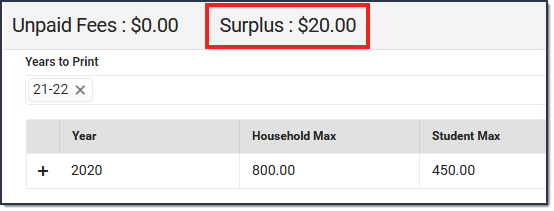
Make Refund from Surplus Amount
Deposits create a surplus that can be applied to future fee assignments.

- Click the Make Deposit button. The Payment panel displays.
- Enter the amount of the deposit in the Payment Total field.
- Enter the Payment Date in mmddyyyy format.
- Select a Payment Method from the dropdown list.
- Cash
- Check - enter a Check #
- Record Credit/Debit Card - enter a Reference #
- Enter any Comments associated with the deposit.
- Click Make Deposit.
The Surplus amount is updated and can be applied to an unpaid fee at any time.

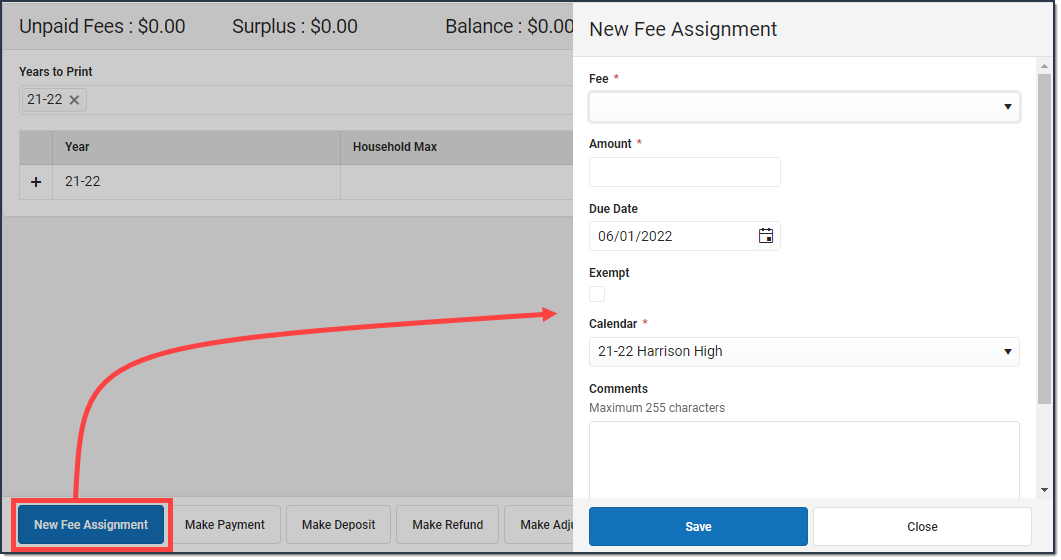
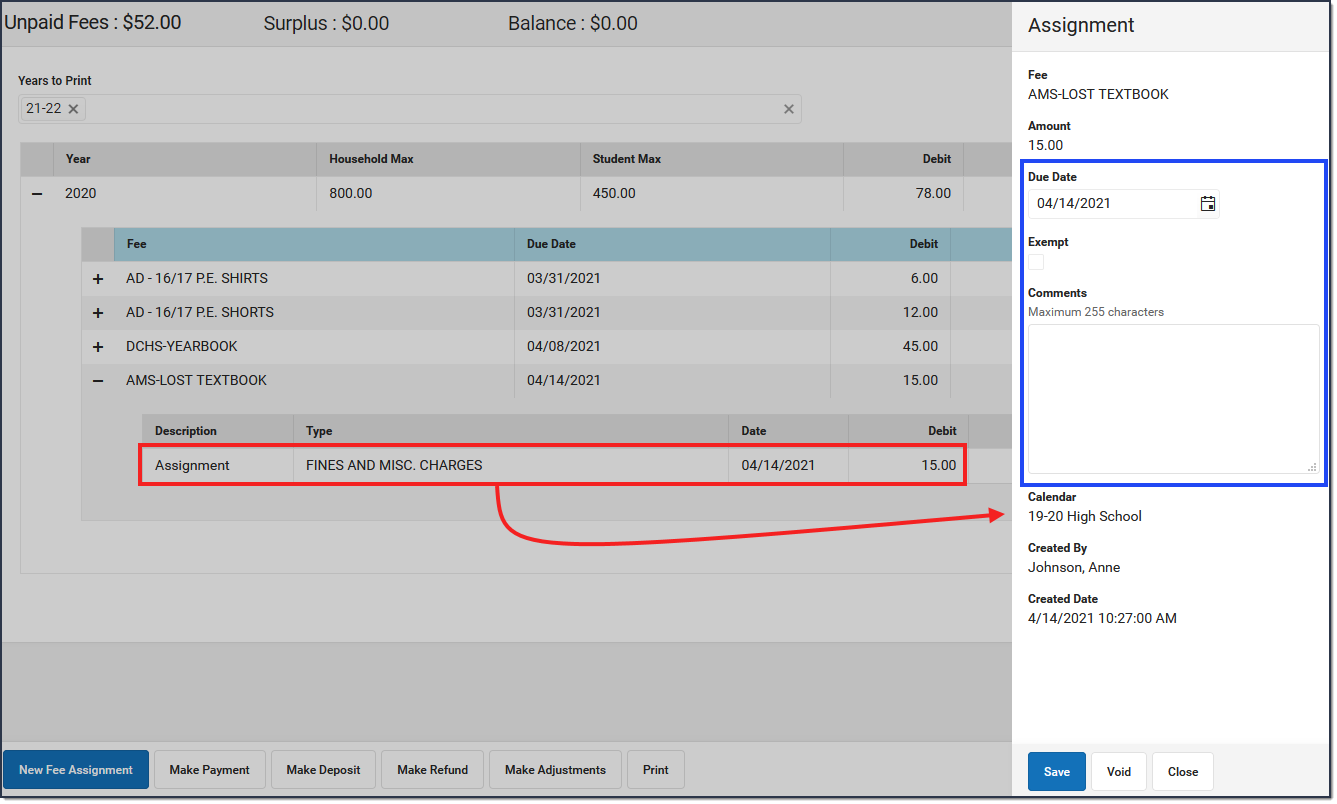
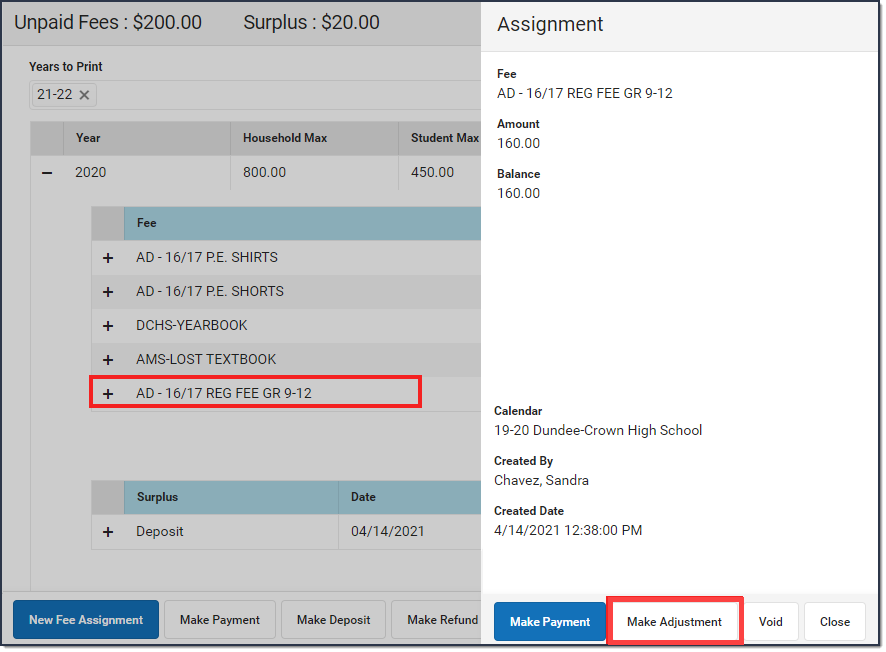










 The payment displays below the fee(s) with the type and date of the payment, the amount paid in the Credit column. If more than the amount of the fee selected is paid, the extra amount becomes a
The payment displays below the fee(s) with the type and date of the payment, the amount paid in the Credit column. If more than the amount of the fee selected is paid, the extra amount becomes a 




 Clicking Continue voids the payment and deposits the amount of the online payment into the surplus, and the payment can NOT be refunded in the
Clicking Continue voids the payment and deposits the amount of the online payment into the surplus, and the payment can NOT be refunded in the 